You know, gambling goes way back – further than most of us realize. Think about our earliest ancestors, huddled around fires, tossing marked bones and wondering what fate had in store for them. It wasn’t just a game back then. Well, it was actually pretty serious business.
Let’s be real for a minute. When those ancient folks carved their first dice out of clay or animal bones, they weren’t planning a fun night out. They were trying to make sense of their world and figure out what their gods were thinking. Pretty deep stuff, right?
Picture this: ancient temples where priests would throw special lots to understand divine messages. Fast forward to today, and we’ve got sophisticated casinos running complex computer programs to calculate odds. Talk about a journey! But here’s the interesting part – whether it’s those early religious ceremonies or modern-day poker games, we humans have always been fascinated by chance.
You might wonder what connects these ancient rituals to today’s slot machines and poker tables. Well, it’s simple really. We’re still doing what our ancestors did – testing our luck, challenging fate, and trying to figure out if we can outsmart destiny. Some things never change, even if the tools we use sure have.
So next time you’re placing a bet or rolling dice, remember you’re part of a tradition that’s as old as human civilization itself. Pretty cool when you think about it that way, isn’t it?
Prehistoric Origins of Games
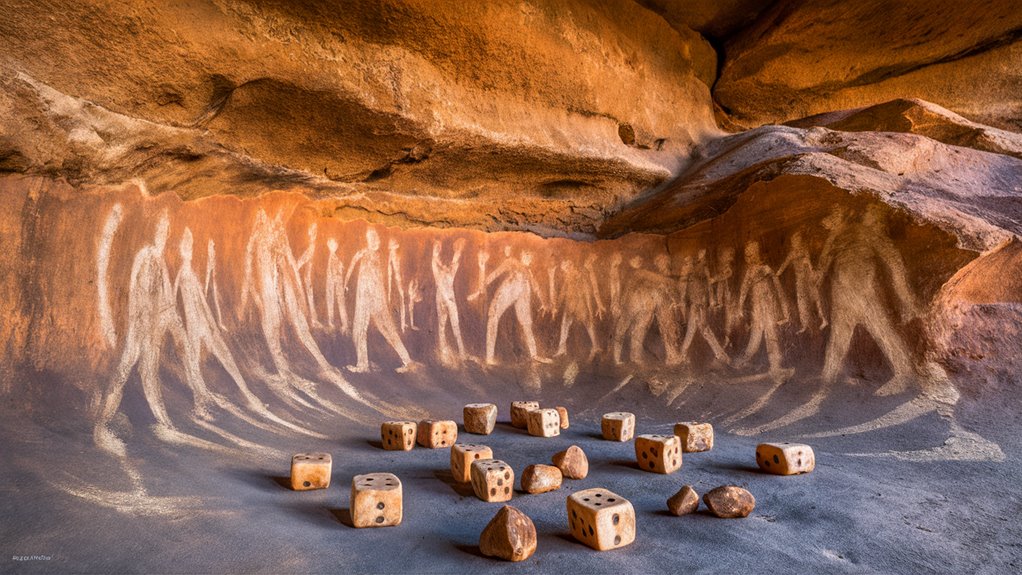
You know what’s fascinating? Humans have been drawn to games of chance since before we even had written language.
Picture this: our ancestors sitting around fires, tossing carved animal bones like dice and playing with painted pebbles over 40,000 years ago. It’s pretty amazing to think they already grasped basic concepts of probability and got that same rush we feel today when taking chances.
Take a walk through ancient caves in Europe and Asia, and you’ll spot something interesting – markings that probably served as prehistoric scoreboards.
The first proper six-sided dice showed up around 3000 BCE in Mesopotamia, while the ancient Egyptians were rolling ivory dice by 2000 BCE. But before all that? People simply used sheep knucklebones as nature’s ready-made dice. Pretty resourceful, right?
What really catches my attention is how these early games mixed luck with actual skill.
Think about it – whether they were throwing stones at targets or trying to predict how those carved bones would land, our ancestors weren’t just leaving everything to chance.
These games became real community events, bringing people together just like sports do today. And let’s be honest, who doesn’t enjoy a friendly game night with family or friends? Looks like that social aspect of gaming hasn’t changed much in 40,000 years.
Ancient Civilizations and Betting Rituals
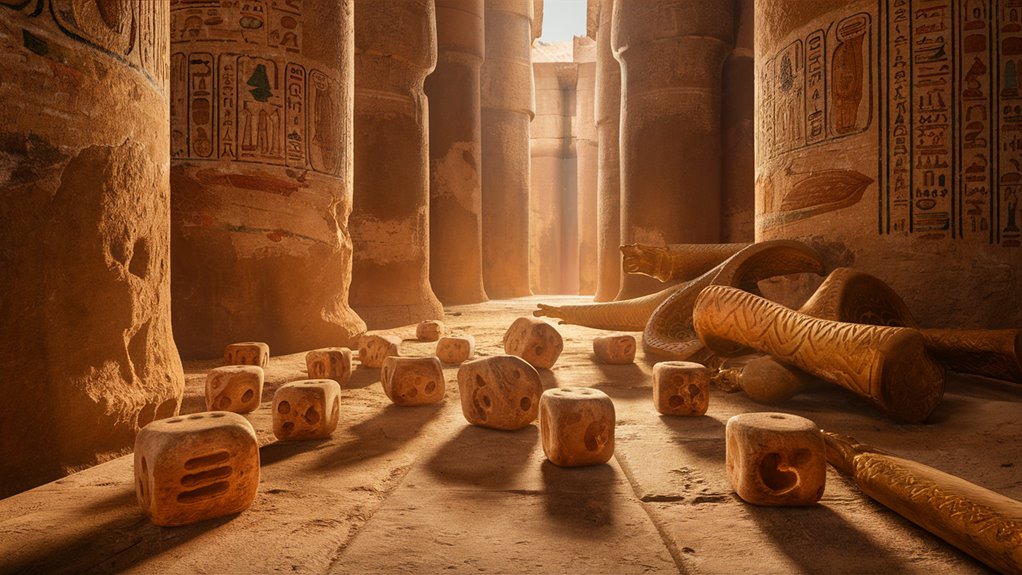
Let’s dive into the fascinating world of ancient gambling rituals. You know how we think of gambling today as mostly entertainment? Well, in ancient times, it was so much more than that.
Take ancient Egypt, for instance. People didn’t just roll dice for fun – they believed these games opened up a direct line to their gods.
Picture this: priests standing in grand temples, casting lots to make 토토사이트 life-changing decisions while ordinary folks watched in anticipation. During funeral ceremonies, gambling wasn’t just allowed, it was practically required as a way to connect with the afterlife.
Ancient Chinese culture took betting to another level, especially during harvest festivals. Can you imagine placing bets on animal fights not just for entertainment, but to actually earn divine favor?
What’s really interesting is how the imperial court used these gambling outcomes. They weren’t just games, they helped shape military strategies and even settled disputes between powerful nobles.
The Romans, well, they really knew how to embrace gambling culture. During the wild Saturnalia festivals, something remarkable happened – social barriers came crashing down as slaves could actually gamble alongside their masters.
The Romans didn’t mess around with their betting either. They developed complex systems and had dedicated gaming houses, kind of like our modern casinos.
Even the big shots got in on the action, with emperors like Augustus and Claudius trying their luck with dice games. And get this – military commanders would sometimes let a roll of the dice decide their battle plans and how to split up their war spoils. Pretty wild, right?
Religious Attitudes Toward Chance
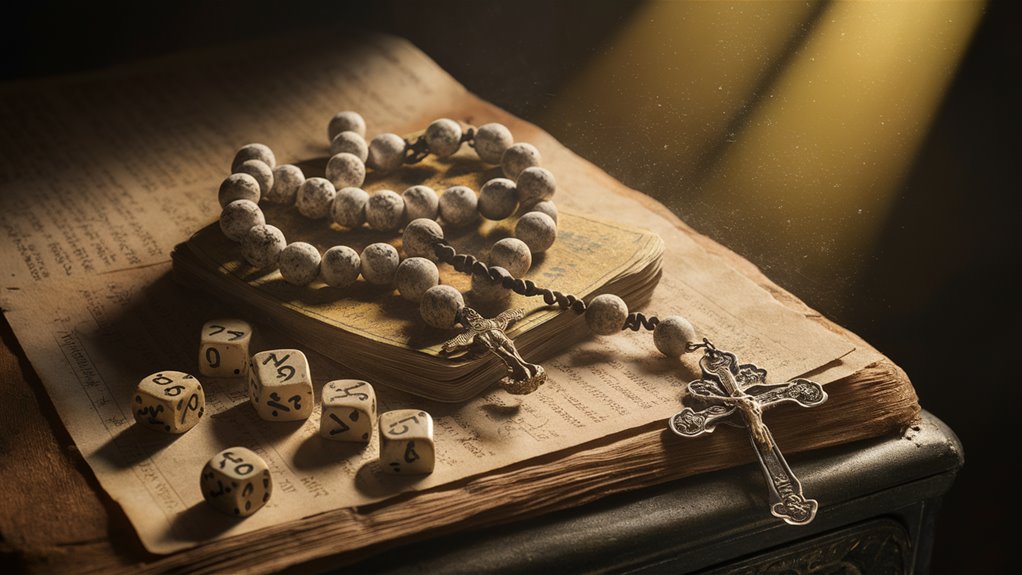
Let’s talk about how different religions view games of chance. You know how some people think religion and gambling don’t mix? Well, it’s actually more complicated than that.
Throughout history, ancient societies saw gambling as something spiritual, but modern religious views are pretty diverse.
Take Christianity, for instance. Most Christian denominations aren’t big fans of gambling, seeing it as a path to greed that pulls people away from their faith.
But here’s an interesting twist: the Catholic Church is a bit more flexible, basically saying “everything in moderation.”
When it comes to Islam, things are pretty clear-cut. Most Islamic scholars look at the Quran’s ban on “maisir” and say gambling is completely off-limits. No gray area there.
Buddhism takes a different approach. While you won’t find any strict “thou shalt not gamble” rules, Buddhist teachings warn that it can lead to suffering through attachment to material gains.
Now, Judaism might surprise you a bit. It’s not all black and white. Sure, the Talmud isn’t thrilled about professional gamblers, but casual gaming? That’s generally okay, especially during festivals like Hanukkah. Pretty interesting, right?
As for Hinduism, well, it’s got some dramatic stories about gambling gone wrong. Just check out the Mahabharata, where a dice game leads to all sorts of trouble.
But get this: some Hindu festivals actually include traditional gambling activities as part of the celebration. Just goes to show how complex these religious attitudes can be.
Medieval Gambling Houses
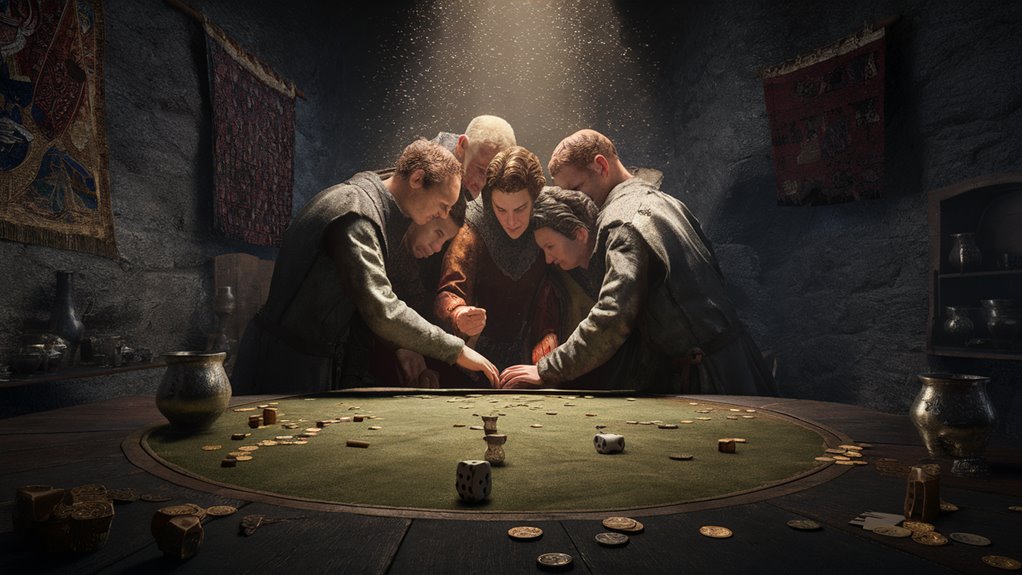
Let’s dive into the fascinating world of medieval gambling houses, those lively spots that popped up all over Europe’s busy cities back in the Middle Ages.
Picture this: tucked away in narrow alleyways, these establishments offered everything from simple dice rolls to early versions of card games, often operating in that tricky space between legal and not-quite-legal.
You know what’s interesting? These places drew in quite the mix of people. Walk into one of these gambling dens and you’d bump into wealthy merchants rubbing shoulders with common folk, while nobles tried their luck at the next table over.
Most had a pretty smart setup – the front room worked like a regular tavern, serving food and drinks, while the real action happened in the back rooms where games of chance ruled supreme.
Speaking of games, dice was the big thing back then. Ever heard of hazard? It’s basically the grandfather of modern craps. But here’s a fun fact: once paper became easier to produce in the 1300s, card games really started taking off.
But these weren’t just places to bet your coins. Think of them more like the social media of their time – spots where you could catch up on the latest gossip, shake hands on business deals, or just escape the strict social rules of medieval life for a while.
The local religious folks weren’t too happy about it all, and kept trying to shut these places down. But just like your favorite neighborhood pub today, these gambling houses knew how to roll with the punches, adapting to whatever new rules came their way while keeping their regular customers happy.
Playing Cards Through Time
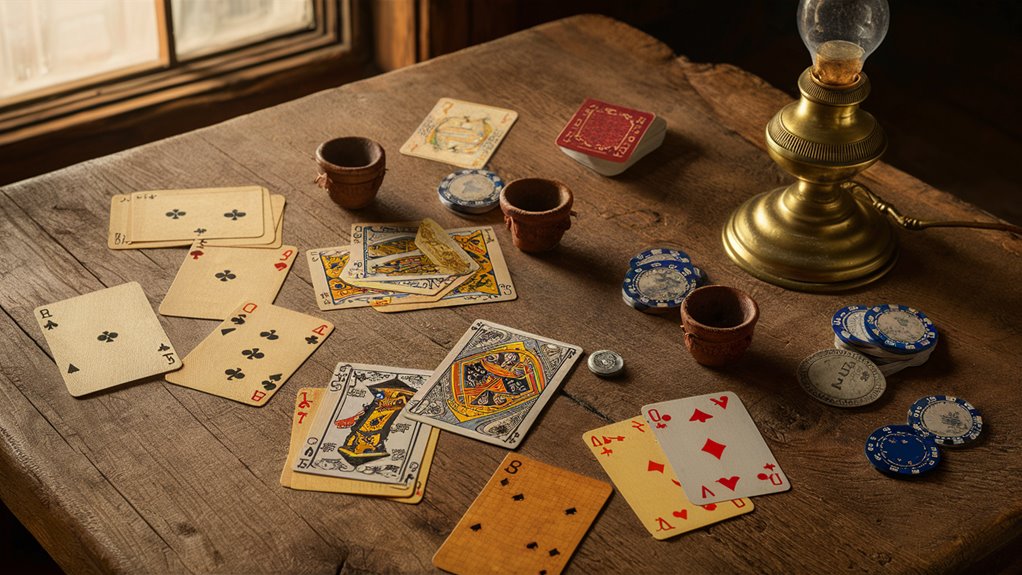
Ever wonder how those cards in your desk drawer came to be?
The story of playing cards is pretty fascinating, stretching all the way back to 9th century China, where the royal court first got hooked on these paper treasures.
Think of it like an ancient version of viral content, spreading across trade routes through Asia until it reached Egypt and Persia, finally landing in Europe around the late 1300s.
You know those hearts, diamonds, clubs, and spades we’re all familiar with?
Well, they actually started out looking quite different. The original suits were inspired by coins, cups, swords, and, believe it or not, polo sticks.
It wasn’t until French card makers got their hands on them in the 1500s that we started seeing the court cards and symbols we recognize today.
The journey of playing cards is really a story of human creativity and adaptation.
Just imagine, what started as hand-painted luxury items for the wealthy gradually transformed into something we can all enjoy.
These cards have worn many hats through the centuries, from helping fortune tellers peek into the future to bringing friends together for a game night.
Next time you shuffle a deck, take a moment to appreciate that you’re holding centuries of history, cultural exchange, and artistic evolution right in your hands.
Pretty cool when you think about it, right?
The Birth of Modern Casinos
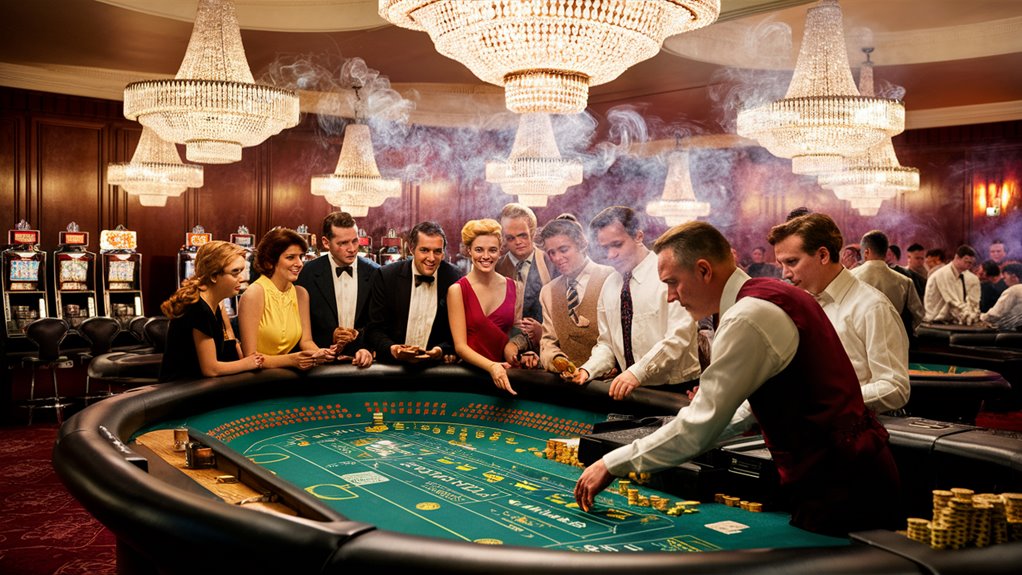
You know, the story of modern casinos is pretty fascinating. It all started back in 1638 in Venice, where the Ridotto opened its doors as Europe’s first legal gambling spot.
Think of it as the grandfather of today’s casinos, complete with fancy dress codes and high-stakes games that attracted the who’s who of society.
As gambling fever spread across Europe, some incredible venues popped up. Take Baden-Baden in Germany, for instance, or the legendary Monte Carlo Casino that opened in 1863.
Actually, Monte Carlo is a funny story, because this single casino turned tiny Monaco into a hotspot for the rich and famous, inspiring similar venues worldwide.
Things developed a bit differently in America. Picture this: elegant riverboat casinos cruising down the Mississippi, Wild West saloons where cowboys tried their luck between shootouts.
But the real game-changer? That came in 1931 when Nevada said yes to legal gambling. Fast forward to 1941, and El Rancho Vegas opens its doors on what we now call the Strip, basically writing the blueprint for the casino resorts we know today.
Looking at modern casinos, it’s amazing to see how those early gambling houses shaped what we’ve now.
These days, when you walk into a casino, you’ll find everything from classic table games to flashy slot machines, plus luxury hotels, shows, and restaurants that would make those old-time gamblers’ heads spin.
Prohibition and Underground Gambling
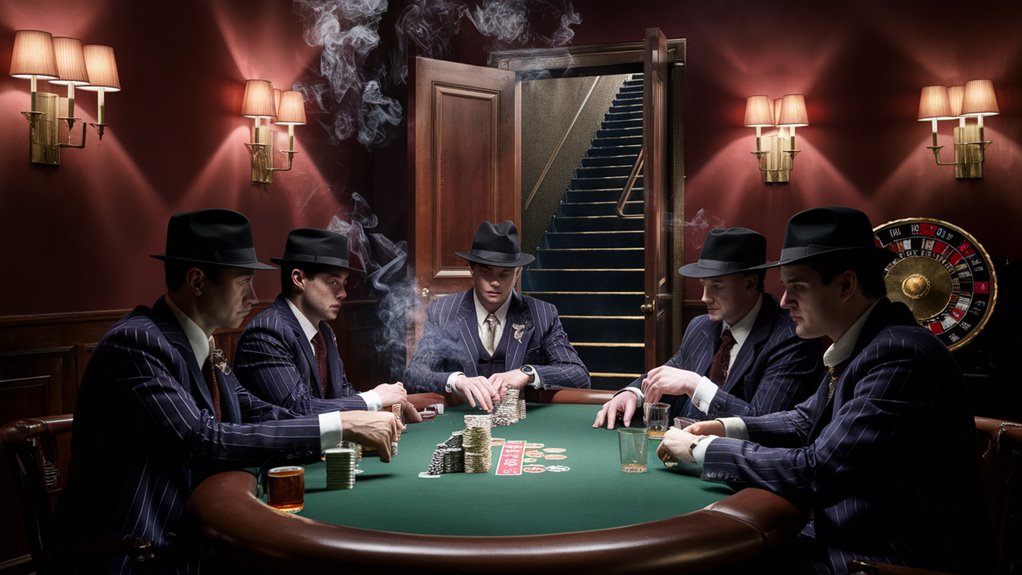
You know how things tend to go underground when they’re banned? Well, that’s exactly what happened with gambling during Prohibition in 1920. People didn’t just stop betting – they got creative about it.
Behind innocent-looking storefronts and tucked away in basement speakeasies, a whole secret world of gambling emerged. And guess who stepped in to run the show? The mob, naturally.
Picture this: you’re a gambler in Chicago or New York back then. Getting into these hidden spots wasn’t as simple as walking through the front door. You needed the right connections, secret passwords, and most importantly, the street smarts to stay safe.
Because let’s face it, these weren’t your friendly neighborhood card games. The stakes went way beyond just losing money – you’d to worry about police raids, getting robbed, or dealing with some pretty unfriendly debt collectors if luck wasn’t on your side.
The criminal organizations running these operations had their fingers in everything. From poker games to horse racing, they built incredibly complex networks. They even had local cops in their pockets, which made the whole thing run even smoother.
It’s pretty wild when you think about it, but this dark chapter actually shaped the future of American gambling in a big way.
Take Las Vegas, for instance. When it started booming in the 1930s, a lot of those flashy first casinos were built with mob money. It took decades for Vegas to shake off that connection, but the influence of those underground gambling days left quite a mark on American casino culture.
Pretty interesting how something that started in hidden basements ended up becoming the foundation for America’s gambling capital, right?
Digital Age Betting Evolution
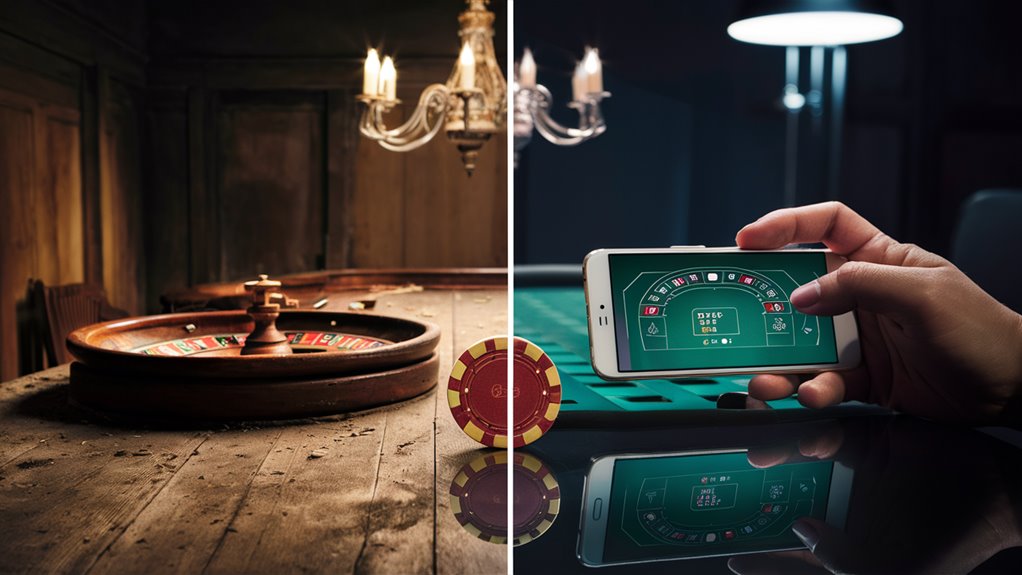
Let’s talk about how online gambling has completely changed the betting landscape since the late ’90s. You know those basic poker sites we’d back then? Well, they’ve evolved into something way more sophisticated.
These days, you can pretty much experience the thrill of a real casino right from your couch, which makes traditional gambling spots seem almost old-school.
Think about it – you can now pull out your phone and instantly access thousands of games. Want to use cryptocurrency? No problem.
The whole industry has gotten super tech-savvy, with AI figuring out what games you might like and blockchain making sure everything’s above board. It’s pretty wild how you can join a poker game in Vegas while sipping coffee in your London apartment, or sneak in a few slot spins during your morning bus ride.
But here’s the thing about all this convenience: it’s created some real challenges too. Governments are scratching their heads trying to figure out how to regulate everything properly.
Casino operators are constantly playing cat and mouse with cyber criminals. And let’s be honest, keeping tabs on problem gambling has gotten trickier since anyone can place bets around the clock without leaving their house.
Psychology of Risk Taking
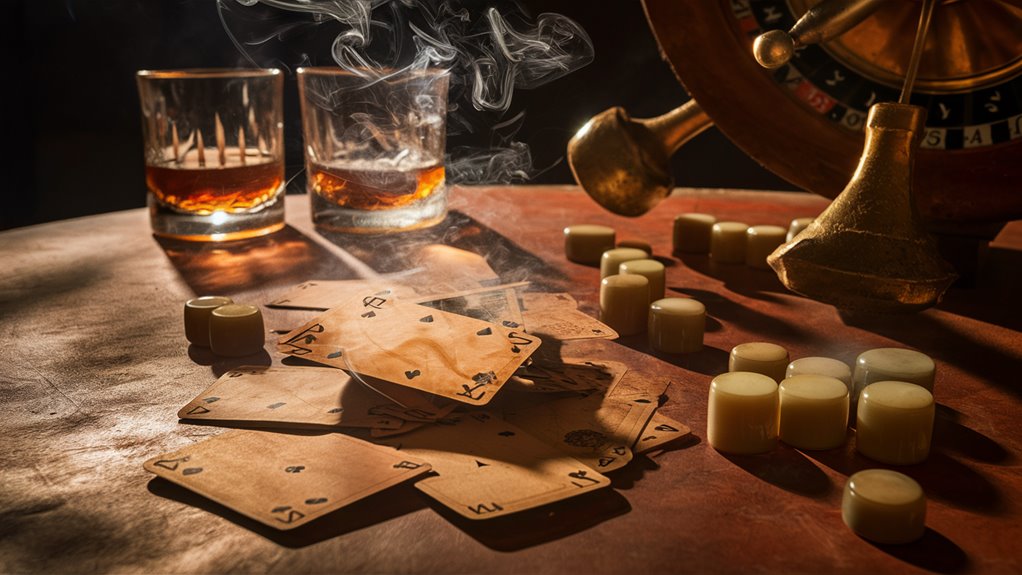
Ever wonder why we’re drawn to taking risks? Well, it turns out our social connections and cultural background play a huge role in shaping how brave or cautious we become.
Think about the last time you played cards with friends – chances are you felt more adventurous than if you were playing alone. It’s fascinating how our brains work in these situations.
You know what’s really interesting? The way different cultures view risk-taking varies dramatically. What seems like a bold move in one society might be totally normal in another.
Take gambling, for instance. Your brain does this quirky thing where it treats near-misses almost like wins, which explains why it’s so hard to walk away from the table when you’re “this close” to winning.
But this isn’t just about casino games or betting on sports. Our relationship with risk is deeply woven into who we’re as humans.
From ancient civilizations rolling dice to modern-day stock market investing, risk-taking has always been part of our story. Whether you’re deciding to start a new business or trying your luck at the roulette table, these same psychological triggers are at work, nudging you toward that next big decision.
Social Impact of Gaming
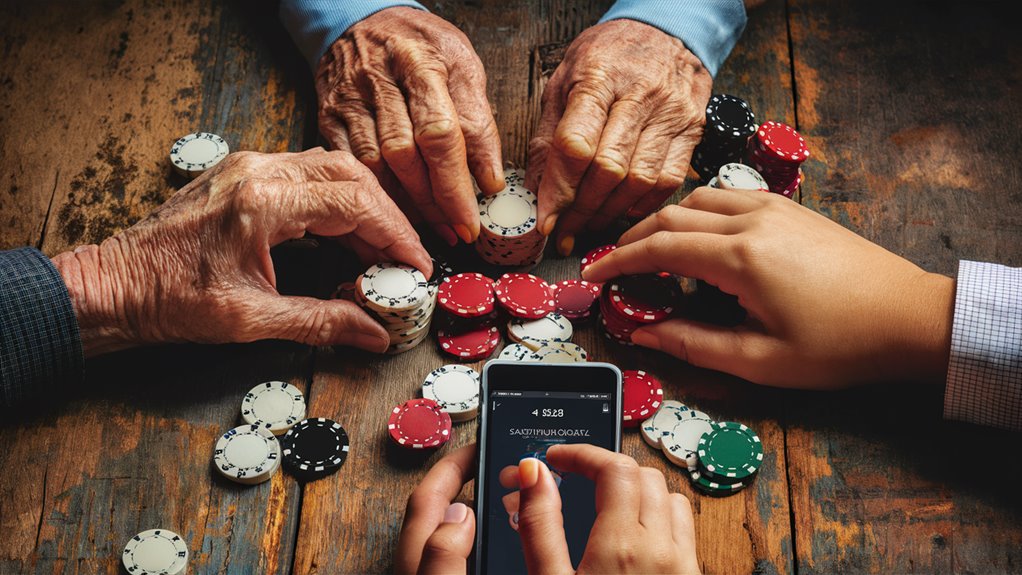
Let’s talk about how gaming has woven itself into the fabric of our society. You know, it’s pretty fascinating how something that started as simple entertainment has grown into this massive force that touches nearly every aspect of our lives.
Think about your own community for a moment. Gaming isn’t just about people playing their favorite titles anymore – it’s creating whole new economies, shaping how we interact with each other, and even influencing the way we spend our free time. Pretty wild, right?
On the bright side, gaming has brought some really cool things to the table. It’s created countless jobs in development, marketing, and esports. Video game tournaments now fill massive stadiums, and streaming has turned gaming into a legitimate career path for many people.
Ever noticed how many of your friends are now making money through gaming-related activities?
But let’s be real for a second – there’s another side to this story. Some folks struggle with gaming addiction, spending way too much time glued to their screens instead of connecting with family and friends in person.
Parents worry about their kids getting too wrapped up in virtual worlds, and there are valid concerns about online harassment and toxic behavior in gaming communities.
The cultural impact runs even deeper than you might think. Gaming has influenced everything from how we learn (remember educational games?) to how we socialize.
These days, people are just as likely to meet up in a virtual world as they’re at a local coffee shop. And with mobile gaming becoming so huge, practically everyone’s got some kind of game right in their pocket.
It’s pretty incredible to see how gaming has transformed from being “just for kids” into something that touches almost every part of modern life, whether we realize it or not.
Common Questions
Which Gamblers Have Won the Most Money and Never Gambled Again?
You know how most gamblers dream of hitting it big and walking away? Well, some actually did just that. Take Archie Karas, for instance – this guy pulled off what many consider the greatest gambling streak ever, turning a tiny stake into a mind-blowing $40 million. But here’s the thing: despite his incredible run, Karas couldn’t quite resist the tables’ pull and kept playing.
On the flip side, we’ve got Peter Eastgate, who really did manage to walk away. After snagging a massive $9.15 million prize at the World Series of Poker, he pretty much called it quits from professional gambling. Talk about perfect timing, right? While most players might have been tempted to chase even bigger wins, Eastgate basically took his chips and went home.
It’s pretty rare to find gamblers who actually stick to their guns and quit while they’re ahead. Sure, hitting a massive win sounds great, but having the discipline to never place another bet? That’s a whole different story. Eastgate stands out as one of those rare examples who knew exactly when to fold and stay folded.
How Do Professional Gambling Syndicates Avoid Detection by Casino Security Systems?
You know, it’s totally natural to be curious about casino security systems, but here’s the thing – trying to work around them isn’t just risky, it’s actually illegal. Let me level with you about why this matters.
Think of casinos like any other business – they need to protect their assets and ensure fair play for everyone involved. It’s kind of like asking how to bypass a bank’s security system. Sure, it might be interesting from a technical standpoint, but we can’t really go there.
Instead, let’s talk about what you can do to enjoy gambling responsibly and legally. Have you considered learning more about game strategies that don’t involve beating the system? For example, understanding odds in poker or blackjack can really improve your game while keeping everything above board.
The casino industry actually has some fascinating legitimate aspects worth exploring. From the psychology of game design to the mathematics behind odds calculation, there’s so much to discover without crossing any legal lines.
Bottom line? The real thrill of gambling comes from playing smart and fair, not from trying to outsmart security systems. If you’re interested in gambling, I’d be happy to point you toward some legal resources that can help you understand the games better and maybe even improve your chances of winning – the right way.
What Rare Gambling Artifacts Fetch the Highest Prices at Auctions?
You know what’s fascinating about the gambling collectibles market? Some of these rare pieces can fetch absolutely incredible prices at auction. Take those gorgeous antique poker chips, for instance – the ones from legendary casinos like the original Flamingo or Sands can easily sell for over $100,000 to serious collectors. And don’t even get me started on vintage slot machines. When you find an authentic Liberty Bell machine from the early 1900s, you’re looking at serious money, sometimes north of $300,000. Perhaps the most surprising big-ticket items are those delicate playing cards from the 1800s. Well-preserved decks, especially those with unique artwork or historical significance, regularly command six-figure sums when they cross the auction block at places like Christie’s or Sotheby’s. The really special ones, with documented connections to famous gamblers or iconic gaming establishments, can spark intense bidding wars among collectors who just have to own a piece of gambling history.
Which Traditional Gambling Games Have Completely Disappeared From Human History?
You know what’s fascinating about gambling games? They’re incredibly resilient. While we might think some ancient games have completely disappeared, the truth is that most of them are still around, just wearing different clothes, so to speak. Take backgammon, for instance. It’s actually a modern cousin of an ancient Roman game called Tabula, which people played thousands of years ago.
Think of these games like family trees. The old games didn’t really vanish, they just had kids and grandkids that adapted to different times and cultures. Astragali, where people used sheep knucklebones as dice, might sound extinct, but its DNA lives on in every game of craps played in Vegas today. And Par? Well, that old betting game influenced countless card games we still enjoy.
How Have Natural Disasters Influenced the Relocation of Major Gambling Hubs?
Let’s talk about how Mother Nature has shaped the gambling industry in some pretty dramatic ways. When Hurricane Katrina hit the Gulf Coast, it completely transformed the casino landscape. Many gaming establishments that once floated proudly along the Mississippi coastline had no choice but to pack up and move inland. You know how they say “the house always wins”? Well, not when nature deals the cards.
In Asia, it’s a similar story, but with different disasters calling the shots. Devastating tsunamis and earthquakes have forced casino operators to rethink everything about how they build and where they build. These days, gaming centers in places like Macau and Singapore don’t just focus on the glitz and glamour – they invest heavily in sophisticated earthquake-resistant designs and flood protection systems. Think of it as an insurance policy that’s built right into the foundation.
Some casino operators learned their lessons the hard way, but these challenges have actually led to some pretty innovative solutions. Now, when new gambling destinations pop up, you’ll often find them in spots carefully chosen to minimize natural disaster risks. After all, even the biggest jackpot won’t matter much if the building can’t stay standing.
